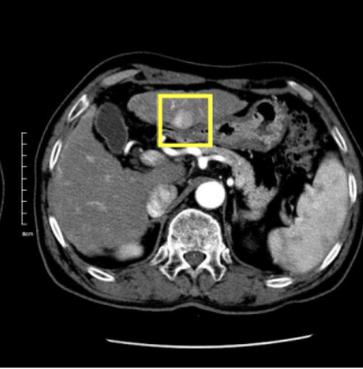DKMA-ULD: Domain Knowledge augmented Multi-head Attention based Robust Universal Lesion Detection
Incorporating data-specific domain knowledge in deep networks explicitly can provide important cues beneficial for lesion detection and can mitigate the need for diverse heterogeneous datasets for learning robust detectors. In this paper, we exploit the domain information present in computed tomography (CT) scans and propose a robust universal lesion detection (ULD) network that can detect lesions across all organs of the body by training on a single dataset, DeepLesion. We analyze CT-slices of varying intensities, generated using heuristically determined Hounsfield Unit(HU) windows that individually highlight different organs and are given as inputs to the deep network. The features obtained from the multiple intensity images are fused using a novel convolution augmented multi-head self-attention module and subsequently, passed to a Region Proposal Network (RPN) for lesion detection. In addition, we observed that traditional anchor boxes used in RPN for natural images are not suitable for lesion sizes often found in medical images. Therefore, we propose to use lesion-specific anchor sizes and ratios in the RPN for improving the detection performance. We use self-supervision to initialize weights of our network on the DeepLesion dataset to further imbibe domain knowledge. Our proposed Domain Knowledge augmented Multi-head Attention based Universal Lesion Detection Network DMKA-ULD produces refined and precise bounding boxes around lesions across different organs. We evaluate the efficacy of our network on the publicly available DeepLesion dataset which comprises of approximately 32K CT scans with annotated lesions across all organs of the body. Results demonstrate that we outperform existing state-of-the-art methods achieving an overall sensitivity of 87.16%.
PDF Abstract British Machine 2021 PDF British Machine 2021 AbstractDatasets
| Task | Dataset | Model | Metric Name | Metric Value | Global Rank | Benchmark |
|---|---|---|---|---|---|---|
| Medical Object Detection | DeepLesion | DKMA-ULD | Sensitivity | 87.16 | # 2 |





 DeepLesion
DeepLesion
